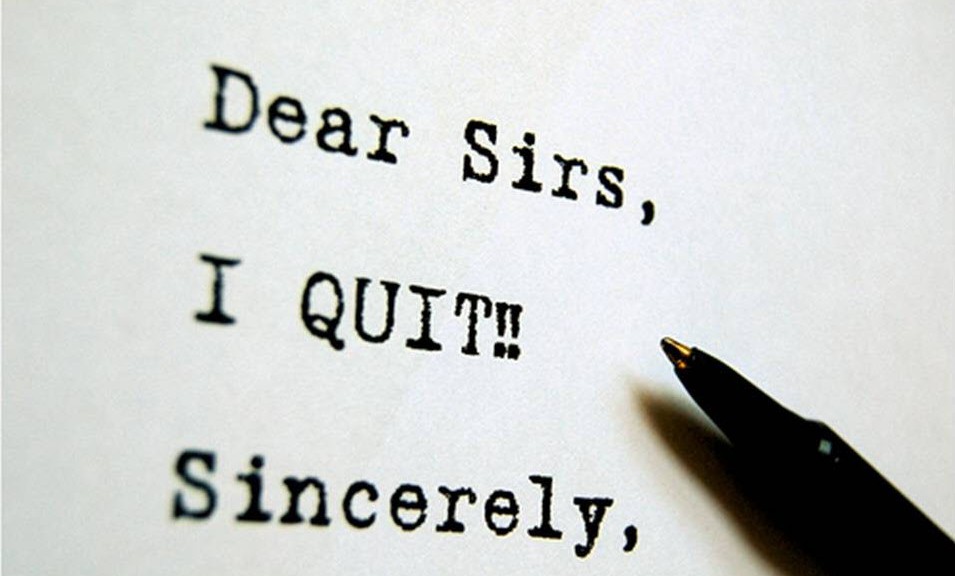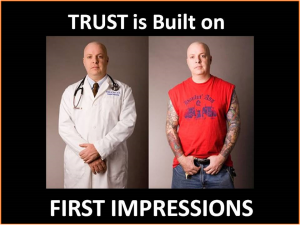It’s a BIG decision, resigning.
And whether you’re leaving because of a ‘bigger & better’ opportunity; because your current employer is an absolute b#@$t!@d or because you’re just not content – you need to make sure that you exit in the right manner.
Tendering your resignation is a daunting process. The stress that it brings on is up there with getting married, buying a house and moving according to some studies from around the world. Whilst the temptation might be there to tell your current employer precisely where to stick that resignation letter, I urge you to think better of it, no matter how rude/difficult/inconsiderate/abusive/etc they may be. Not that I’m condoning any of the above, but as my Mum always used to say to me, “two wrongs don’t make a right”, so it’s up to you to be the bigger person and rise above the temptation to retaliate or mouth-off. It’s paramount to you and your future career that you remain level-headed, because you never know when you may bump in to the person again and, particularly if you’re staying in the same industry, you never know when you might need “friends” (think reference/referee). Not to mention, in our industry, there is every chance that you will see them at a conference, function or meeting!
With the above in mind, here’s some further advice to assist you through the process:
1. Plan. Plan.. And PLAN…!
Get your contract out (or the Award if you don’t have a contract) and make sure you know what your obligations are – what’s the notice period you have to give; are there any restrictions on where you can work next (competition); when is your bonus due; what are your leave entitlements; etc? If there is a specific date/deadline that you need to hit (for a new role), make sure that you know what it is and make this your end goal – ie. what you HAVE to achieve when you hand in your notice and verbalise your intentions to your manager.
Make sure you know who it is that you should be handing your resignation in to (your line manager or his/her manager or the GM/CEO). Also think about your timing and plan for what will get YOU the best result. Sometimes, due to deadlines, you can’t afford to be picky about the “when”, but in general try to do it when the person that you are going to see is going to be the most responsive, ie. not in a bad mood; not rushing to another meeting; not under the pump; not leaving to go home; not on annual leave; etc. I guess ultimately, regardless of how you feel about the person/organisation, try your best to put yourself in the position of the person that will be receiving the news (and the pressure that that may bring) and treat them as you would like to be treated – being considerate goes a long, LONG way!
And plan for point 4 below – the OUTCOME of your resignation…
2 Document Your Resignation in Writing (but deliver it in person)
Your written resignation should be short and sweet. No ‘War & Peace’ ramblings required here as the important detail gets lost! Keep it simple:
- Address the letter properly & appropriately
- Lay it out properly and DO NOT forget to date it with the correct date as this becomes the date that your resignation is effective from.
- (Having checked your notice period obligations) Inform your employer of the date that your notice period is effective from (today’s date), the period it is for (eg. 4 weeks) and what the date is that you are terminating your employment on (ie. the date 4 weeks from today)
- Thank them (in one or two lines at the most). Ideally, this shouldn’t be too difficult. You might like to thank them for their support, guidance and nurturing of you throughout your tenure. Or you might like to say thank you for the development or promotional opportunities. Whatever it is though, be sincere and if you haven’t got anything good to say – say NOTHING.
- And remember: LESS is sometimes MORE as the last thing you want to do is provide ‘fodder’ for your employer to come back and bash you with (figuratively speaking of course)!
If time permits, don’t tender your letter straight away. Sit on it for a day or two (change the date accordingly) and make sure you go over the pros and cons of your current role and future opportunity. Not to say that you can’t go back once you’ve tendered your resignation, but most of the employers that I know tend to take the view of “if you’ve decided to leave, I’m not going to try to change your mind” (in a positive way as opposed to a narky kind of a way)!
3 Personal delivery
When the time comes, have the fortitude, strength of character and decency to resign in person! It comes down to respect and in most cases, other than the extreme ones, your employer deserves a bit of respect. And even if they don’t, be the bigger person and show them how it should be done by holding your head high and resigning with dignity and professionalism. If you do have any feedback, the time to do it is in person (verbally, not in writing remember) and ALWAYS make sure that you do it constructively and in a positive manner. Hand your letter to the appropriate person, explaining what it is. NOTE: from this point, your resignation date is locked in as this is the date that you have tendered your resignation.
If you believe that it is going to be an unpleasant meeting – prepare yourself mentally for this and if appropriate to do so, you may choose to tender your resignation with another person present (or at least nearby), such as your employer’s Personal Assistant or maybe even your line manager. And whatever you do, make sure that you stay calm, collected, polite and professional, no matter what is said to you (I’m not suggesting for a moment that this will be easy, but stay strong and committed to being the better person)!
4 Be Prepared for the Outcome
This forms part of your planning phase also – so make sure you give this plenty of thought. Plan how you think your employer is going to react and what actions they might take and make sure that you’re prepared. Think back to when other people have resigned or have been asked to leave, how did that go down and how did your employer behave? Give very real consideration to the fact that you might well be asked to clean out your office and leave on the spot, having been locked out of your computer (and any other digital links to the organisation – eg. phone/tablet/intranet) before you even leave your manager’s office!
Whatever the situation, remain calm and professional and try to take it in your stride, without letting your guard down as you need to remain alert to your rights and the employer’s legal obligations – like pay in lieu of notice or bonus cheques that are owed to you as a couple of examples.
5 Tidy Up Loose Ends
As suggested above, this isn’t always possible – but when it is, leave on a high! Make sure you’ve cleaned up your desk, office and computer so that it’s ready for the next person and try to finish off any projects or at least leave them at a stage where someone else can pick them up and run with them. You might even like to leave some basic instructions and/or information for anyone that might need them, like logins to things that need to be kept going, even in your absence. And don’t forget to inform the right departments (when it’s your job to do so), so that the business can prepare for your departure.
Oh! And if you have a uniform (and other company property – such as keys; phones; car; etc), either bring it back dry-cleaned and pressed, ideally on your last day (if you can get away with coming in to work in your own business attire) or within a few days of your departure. Remember: the organisation might be permitted to withhold your final payment until such time as ‘everything’ is returned, so get it back promptly.
6 Your Reputation is Your Greatest Asset! Don’t BURN BRIDGES!
Often, your reputation is all that you can trade on – so make sure it remains a GOOD one! Don’t denigrate the management or organisation and do your utmost to maintain your output/efficiency throughout your notice period. Leave on a HIGH and make sure the departing impression of you is not one of a whinging, lazy, good-for-nothing bum, who slackened off in their last few weeks and did nothing but bag the organisation and belittle their manager!
As suggested above, you never, ever know when you might bump in to this person again and if you’ve read my previous blog “Negotiating Your Salary“, you may remember the employee that I had, that went on a rant as they stormed out of my office only to one day, much later on, be applying for a job in a business that I was managing. Our industry is particularly small and it’s not uncommon for “someone” to know “someone” that knows YOU! With this in mind, it is so important to keep your reputation in tact and not to burn any bridges.
Hopefully the points above will help you navigate through the stressful process of resigning. It’s also worth mentioning that, where possible (ie. when you’re leaving a ‘good’ employer), it’s a good idea to leave the door ajar. What I mean by this is: don’t cut all ties on the spot just because you are going. Make a genuine offer to be contactable should the employer need to ask a question or let them know that you have left instructions for the next person, but they are welcome to call/email you if they require any further clarification. Leaving on a good note leads to a greater chance of being remembered in a good light and therefore being referenced positively should anyone call about you or in conversations around a table (think at conferences, meetings, seminars, networking events where your “new” or “future” employers are also mixing)!
Good luck!











![7828_126641664308_51023034308_2237184_4567344_n[1]](http://blog.whitenow.com.au/wp-content/uploads/7828_126641664308_51023034308_2237184_4567344_n1-150x150.jpg)